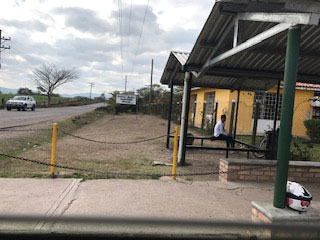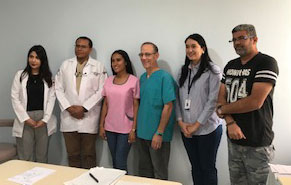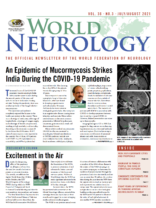With Suggestions for Starting a Clinic
By Lawrence Robbins, MD

Neurology/psychiatry clinic near Tegucigalpa, Honduras.
Starting the Clinic: The clinic is located within an excellent rural medical center near the main city (Tegucigalpa). Associating with an established medical center has been ideal. Ninety-five percent of the population has no access to neurology or psychiatry. I decided that it was crucial to supply various neurology and psychiatry medications. Locating the clinic relatively close to a big city was important. Close access has allowed me to teach in the public hospital, bring in other physicians, and refer patients for tests, Suggestion: Look for an established, well-run clinic, and locate within proximity to an international airport. This may not be feasible in all locations.
Associating With an Organization: It is difficult to start a clinic completely independently. I have had a close association with a well-established organization that runs our medical center. They provide room and board, and also help with security, transportation, and hiring clinic personnel. Suggestion: If possible, find community support. Establish close ties with an organization as there are many benefits.
Funding: Alas, it takes money. Lots of it. The plan was to establish a not-for-profit, which I did. With more resources, I was able to build out infrastructure, supply additional medications, and hire extra staff. Fundraising is important, but is one of the most difficult aspects of the venture. I am lucky to have a number of generous donors. Suggestion: If possible, start a nonprofit organization. This is vital for fundraising.

Staff of the neurology/psychiatry clinic.
Personnel: I began with myself, one chart, and one patient. Over time, we have added two psychiatrists and two neurologists, a nurse administrator, and a psychotherapist. We pay the staff approximately what they would make working in their own private practice. The Honduran physicians are young and idealistic. Networking in neurology and psychiatry circles within the country helped me to connect. Connecting with the local neurology/psychiatry societies has been helpful. Neurologists and psychiatrists are in relatively short supply. The Honduran physicians are excellent, but often underpaid. I occasionally bring in another physician from the United States with me. This is usually a rewarding experience. The nurse administrator is a major key to success. The nurse administrator handles recruitment of patients, scheduling, managing patients in the clinic, medications, and other tasks. Suggestion: An administrator, preferably a nurse, is an invaluable part of the team. The downside of bringing in other physicians, or other personnel from another country, is that you are (somewhat) responsible for their trip and safety.
Charting: We are on paper charts, which is easy, and we keep a medication flow sheet. Our paperwork is minimal. Some notes are in English (mine), most are in Spanish. Since we treat each other’s patients, it helps if we list our thoughts for future considerations. In the beginning, we did not need medication or diagnosis flow sheets, as there were only one or two notes to review. Over time, after 15 or 20 visits, the need for flow sheets becomes apparent. Suggestion: Try to keep medication and diagnoses flow charts. It is beneficial to develop uniform charting, as multiple providers may be treating the patient.
Clinic Infrastructure: We have built out a neurology and psychiatry suite, along with a small pharmacy. If our budget were smaller, we would share space with the medical center, and minimize testing. We have supplied computers, and installed internet capability. The internet (usually) works, allowing me to research various conditions that I encounter. Books are convenient to store on my phone or laptop. However, it is more efficient to actually have the physical book handy. Suggestion: It is helpful to have a section of the pharmacy dedicated to the neurology clinic. Internet capability is extremely useful.
Recruiting Patients: In our clinic, the nurse administrator is in charge of recruitment. We have informed various medical clinics of our existence. We also placed a number of public service ads on radio. The neurologists and psychiatrists in nearby cities refer patients. Eventually, word of mouth drives most of the new patients. We draw patients from the entire country and surrounding countries. Suggestion: By alerting other clinics of your neurology clinic, word of mouth spreads quickly. It is helpful to let other physicians know about the existence of the clinic.
Our Services: Our primary purpose is to provide diagnosis and treatment for the vast underserved population. In addition, we offer free medications. We provide free blood tests and EEGs as well. Much needed psychotherapy services are offered on a limited basis. Psychotherapists are difficult to come by. In some settings, a layperson may be trained to be an “active listener.” We have run into barriers with providing therapy services. These barriers include stigma, reluctance to divulge personal information in a rural community, and lack of therapists. We provide patients with a safe place and offer emotional support. We are usually patients’ sole access to care. Suggestion: If possible, supplying medications is invaluable. If therapists are not available, training lay people is a possibility.
Medications and Pharmacy: The basic meds we provide include: antidepressants, anticonvulsants, mood stabilizers, migraine meds, and Parkinson’s medications. I decided that levetiracetam would be a mainstay. It is safe and does not require blood tests.
Our small neurology/psychiatry pharmacy is kept locked at all times. Suggestion: Choose medications that are relatively safe and do not require blood tests. If you purchase medications locally, you can often negotiate a better price.
Telemedicine: Since we have equipped the clinic with internet access, we have been able to connect remotely. Technically, it is a bit cumbersome. I am in Chicago with an interpreter but no chart, and the patient sits in Honduras with a nurse. The lack of insurance (and other) paperwork is helpful. These visits are not ideal, but better than no access at all. Suggestion: Telemedicine can work if there is adequate internet access.
Tests: Lab, MRI, EEG, etc: We do a limited number of blood tests. These tests are relatively expensive in Honduras. We are performing 20 EEGs on a monthly basis out of our clinic. This has been extremely helpful, as many epilepsy patients have not had an EEG, or any access to neurology. MRI/CT is expensive and not easy to obtain. However, many patients do pay for their MRI (about two weeks’ salary) and they bring in the films. We try to use as little testing as is feasible. Suggestion: Blood tests are important, and negotiating a better price is worthwhile. Diagnosis and treatment are often determined without advanced imaging.
Emergencies: We occasionally have a patient in status epilepticus or other neurologic emergencies. I am available from the U.S. for advice. WhatsApp works the best for remote communication. We stock the Emergency Room with basic medications (eg, fosphenytoin and diazepam for seizures). There is a Public Hospital in the main city, but transporting patients there is an adventure. There is only one local ambulance, and we need permission to use it. Suggestions: Neurologic advice often proves invaluable to the ER doctors. It helps to provide basic neurologic emergency medications.
Teaching/Publications/Videos: I teach neurology and psychiatry residents in Tegucigalpa. We have written a manual in Spanish on management of headache. This manual was distributed to many of the Honduran physicians. Suggestion: Teaching the local physicians is a rewarding experience. Articles document your experience and may spur others to follow your path. Videos of the clinic bring the clinic and patients to life. The videos can be instrumental for fundraising and promotion.
Acknowledgements: It takes a number of people to make this clinic a success. Our incredible donors have provided the crucial funding All of the personnel in SAN (Honduras) have provided vital support. The Honduras clinic staff and doctors are the mainstay. •
Lawrence Robbins, MD, is an assistant professor of deurology at Chicago Medical School. Lrobb98@icloud.com; Chicagoheadacheclinic.com (Honduras Project Section with videos/blogs)
